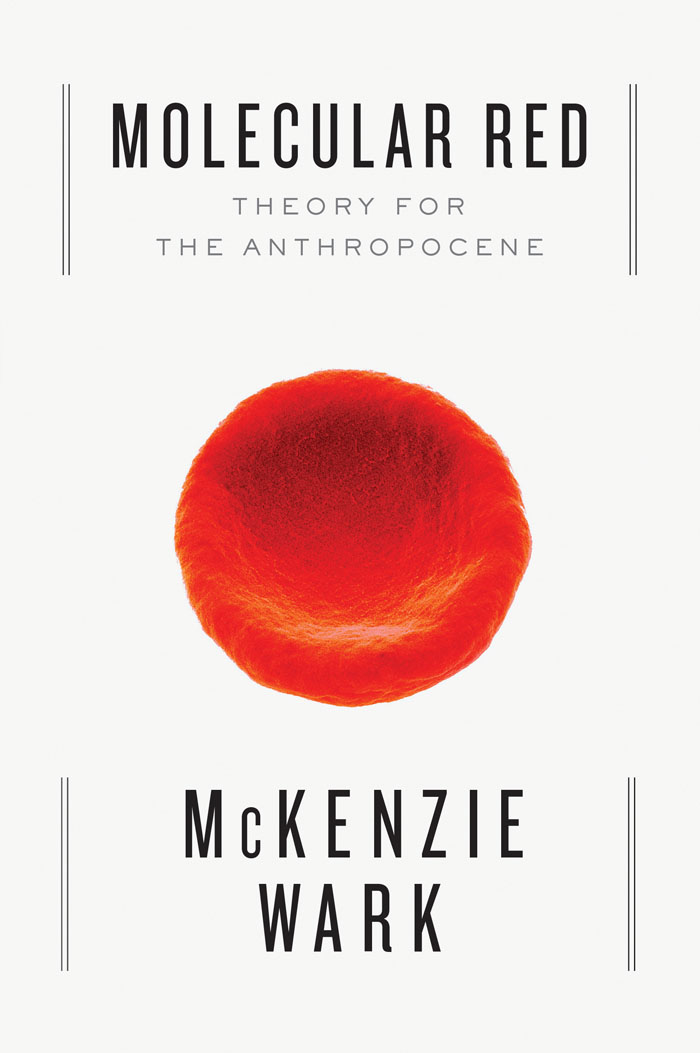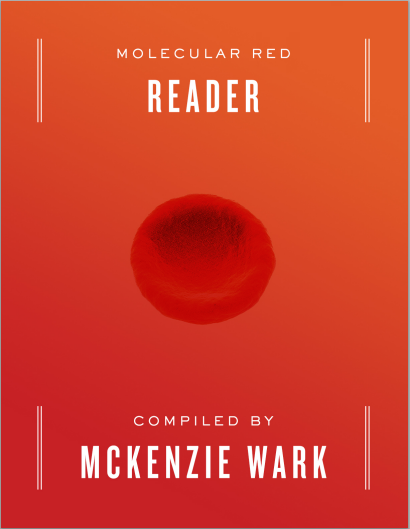McKenzie Wark: Molecular Red: Theory for the Anthropocene (2015)
Filed under book | Tags: · agriculture, anthropocene, climate, climate crisis, communism, cyborg, environment, knowledge, labour, literary criticism, marxism, nature, philosophy, production, proletariat, proletkult, revolution, science, science fiction, technoscience, tektology, theory, utopia


“In Molecular Red, McKenzie Wark creates philosophical tools for the Anthropocene, our new planetary epoch, in which human and natural forces are so entwined that the future of one determines that of the other.
Wark explores the implications of Anthropocene through the story of two empires, the Soviet and then the American. The fall of the former prefigures that of the latter. From the ruins of these mighty histories, Wark salvages ideas to help us picture what kind of worlds collective labor might yet build. From the Russian revolution, Wark unearths the work of Alexander Bogdanov—Lenin’s rival—as well as the great Proletkult writer and engineer Andrey Platonov.
The Soviet experiment emerges from the past as an allegory for the new organizational challenges of our time. From deep within the Californian military-entertainment complex, Wark retrieves Donna Haraway‘s cyborg critique and science fiction writer Kim Stanley Robinson’s Martian utopia as powerful resources for rethinking and remaking the world that climate change has wrought. Molecular Red proposes an alternative realism, where hope is found in what remains and endures.”
Publisher Verso, London and New York, March 2015
ISBN 1781688273, 9781781688274
xxiv+280 pages
Reviews: Slavoj Žižek (Verso 2015, Wark’s response), John Beck (Radical Philosophy 2015), Mark Rappolt (ArtReview 2015), Maria Chehonadskih (Mute 2015, Wark’s response), Two Grenadiers (2015), Pieter Vermeulen & Tom Chadwick (nY 2016), Jim Harper (LSE Review of Books 2016).
Commentary: Joe Guinan (Renewal 2015), Jernej Kaluža (Radio Student 2019, SL).
Video lecture (Concordia U, Apr 2015)
Publisher
WorldCat
See also Molecular Red Reader compiled by Wark (PDF).
Comment (0)J. R. McNeill, Corinna R. Unger (eds.): Environmental Histories of the Cold War (2010)
Filed under book | Tags: · climate, cold war, ecology, environment, geopolitics, history, military, nuclear weapons, politics, war, war studies

“This book explores the links between the Cold War and the global environment, ranging from the environmental impacts of nuclear weapons to the political repercussions of environmentalism. Environmental change accelerated sharply during the Cold War years, and so did environmentalism as both a popular movement and a scientific preoccupation. Most Cold War history however entirely overlooks these developments, which were not only simultaneous but also linked together in ways both straightforward and surprising. The contributors to this book present these connected issues as a global phenomenon, with chapters concerning China, the USSR, Europe, North America, Oceania, and elsewhere. The role of experts as agents and advocates of using the environment as a weapon in the Cold War or, contrastingly, of preventing environmental damage resulting from Cold War politics is also given broad attention.”
Publisher Cambridge University Press, 2010
ISBN 0521762448, 9780521762441
362 pages
Reviews: Chaney (H-Net, 2011), Tucker (Michigan War Studies Review, 2012), Kinkela (Cold War History, 2013).
Conference report by Thomas Robertson (GFI Bulletin, 2007)
PDF (5 MB, updated on 2019-10-11)
Comment (0)International Journal of Communication, 8: Special Section: Media, Hot and Cold (2014)
Filed under journal | Tags: · climate, media, media studies, mediation, meteorology, temperature, weather
“The 21st century will be the century of temperature. As global temperatures rise, polar ice melts, and drought becomes a permanent way of life, temperature has become the single greatest challenge to human life on the planet.
Temperature is also a media problem in many ways: from the heat generated by new media—whether in our hands or in giant server farms; to the technologies used to measure, represent, and understand temperature; to the contribution of new media systems themselves to the problem of global warming. But this is not a new phenomenon. For centuries, media and mediation have been at the center of experiments in and beliefs about temperature and its relation to culture, gender, language, and life. In this special section, we take the 50th anniversary of Marshall McLuhan’s Understanding Media literally to ask “What are hot and cold media?””
Contributors: Alice Christensen, Wolfgang Ernst, Brenton J. Malin, Jessica Mudry, Dylan Mulvin, Lisa Parks, Rafico Ruiz, Nicole Starosielski, Jonathan Sterne, Marita Sturken.
Special section of the IJoC 8
Edited by Dylan Mulvin and Jonathan Sterne
Creative Commons BY-NC-ND License
ISSN 1932-8036
44 pages
PDF (single file)
PDFs (separate articles)

